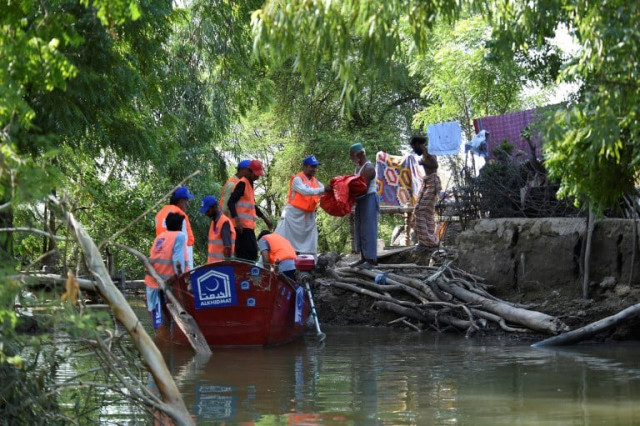PDMA commission remains inactive in Sindh
Despite provincial legislation, the official body has never held even a single meeting on disaster management

The Provincial Disaster Management Authority (PDMA) Sindh, established to prevent and manage natural disasters in the province, has been operating without an active Provincial Disaster Management Commission since its inception. All administrative and financial matters related to relief and rehabilitation are currently being handled through the PDMA Board.
In 2010, PDMA Sindh was formed under the National Disaster Management Act, which mandates the formation of a Provincial Disaster Management Commission. This commission is responsible for formulating policies related to disaster prevention and management and approving funds for their implementation. The 18-member commission was supposed to comprise of elected public representatives, industrialists, and agriculturalists. However, this commission has never been made functional to date.
The members of the proposed commission included the Chief Minister of Sindh, the Leader of the Opposition in the Sindh Assembly (or a nominated person), provincial ministers for Finance, Revenue, Relief and Rehabilitation, Irrigation, Works and Services, Local Government, Health, and Information. It also included representatives from the Federation of Pakistan Chambers of Commerce and Industry (FPCCI), Chamber of Agriculture, Sindh Abadgar Board, and the Karachi Chamber of Commerce and Industry.
Due to the commission's inactivity, all disaster-related matters in the province are being managed by the PDMA Board, although legally the PDMA is supposed to work under the supervision of the commission and seek its approval for all major administrative and financial decisions. In contrast to the commission, the PDMA Board mainly comprises government officials who effectively run its affairs.
Initially, in 2014, the 12-member PDMA Board was headed by the Chief Secretary. In 2016, it was reconstituted, and the Provincial Minister for Rehabilitation was made the chairperson. However, the rest of the members have continued to be government officials. These include the Chairman of the Zakat Council, Senior Member of the Board of Revenue, and secretaries from departments such as Zakat, Finance, Rehabilitation, Irrigation, Local Government, Health, as well as PDMA officers.
In a 2024 report, the Auditor General of Pakistan highlighted that the Provincial Disaster Management Commission in Sindh had still not been established. The report recommended the formation of this commission and also suggested that PDMA should set up a Disaster Risk Reduction Wing to conduct pre-disaster mitigation activities.
On the other hand, PDMA Director General Syed Salman Shah stated that the Provincial Disaster Management Commission was constituted in 2014 but acknowledged that not a single meeting of the commission had been held to date. "In the absence of an active commission, all disaster-related matters are being run through the PDMA Board. The commission is a policymaking forum, and its role cannot be denied therefore, I would not call it unnecessary," said Shah.
Conversely, Ali Khurshidi, leader of the opposition in the Sindh Assembly and senior member of the Muttahida Qaumi Movement Pakistan (MQM-P), stated that although he was legally a member of the commission, he had never been informed of any meeting. "About a year ago, I had asked the Provincial Minister for Rehabilitation, Makhdoom Mehboob Zaman, about the status of the commission. However, the minister had no information at the time but assured me that it would be made active soon. Yet no progress has been made so far," revealed Khurshidi.
In the meanwhile, all disaster-related projects of the Sindh government are executed through the Department of Rehabilitation and PDMA. For the fiscal year 2024-25, a budget of Rs254 million was allocated to the Department of Rehabilitation. Additionally, any funds received from international organizations in the wake of natural disasters are disbursed through the PDMA.




















COMMENTS
Comments are moderated and generally will be posted if they are on-topic and not abusive.
For more information, please see our Comments FAQ